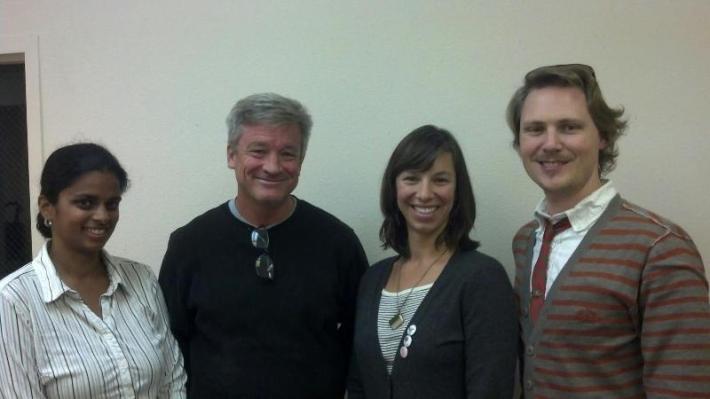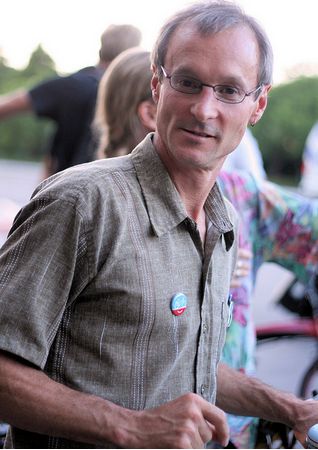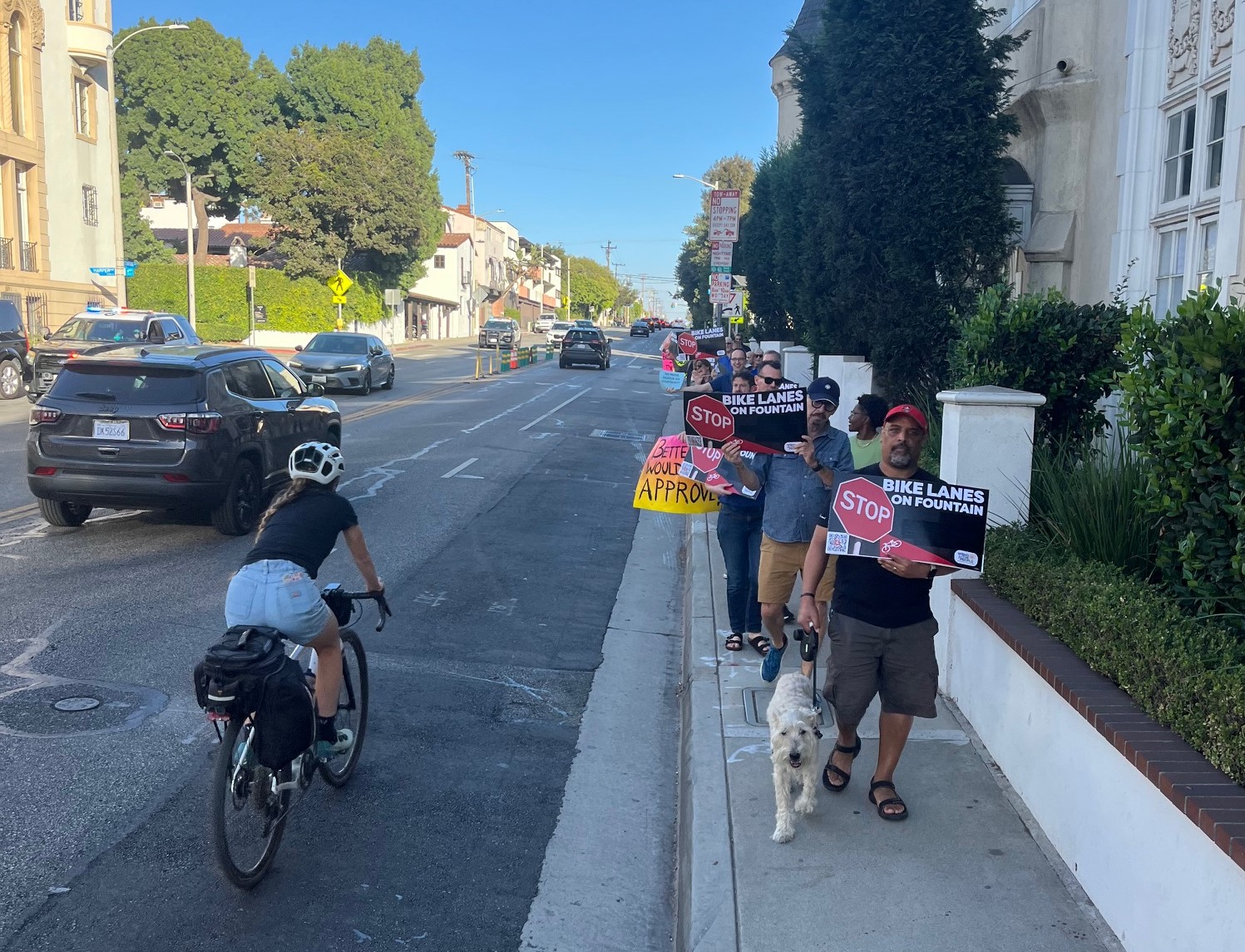The top priority for California bicycle advocates this year? To ensure state funding for biking and walking gets better, not worse.
That's according to California Bicycle Coalition (CalBike) President Dave Snyder, who recently spoke with Streetsblog to lay out the organization's goals and strategies in its 2013 legislative agenda, both in the capitol and across the state.
While CalBike's priorities include a variety of reforms and improvements, the largest concern is threats and opportunities to bicycle and pedestrian funding posed by Governor Jerry Brown's proposed budget. "Our biggest goal remains to influence the state budget, and see it move forward in a good way," Snyder said.
The Governor combined bicycle and pedestrian funding into one "active transportation" category for next year's budget, a change from how budgeting had been accomplished in the past. On one hand, the Governor promises to streamline the application process for these projects. On the other, the most recent draft includes a 10 percent decrease in funding for "active transportation" from last year.
But the budget isn't the only major issue in Sacramento. One of the hottest issues in the Capitol is how to reform the California Environmental Quality Act (CEQA) which creates the environmental review process that development and transportation projects must undergo. In the last legislative session, the legislature and governor passed A.B. 2245, which created a streamlined process for many bicycle projects.
Meanwhile, some of the largest environmental groups in the state are working to reform CEQA again. Recent reports show that most CEQA lawsuits are being aimed at public projects, mixed-use development and infill projects. Rather than look for a sponsor for new bicycle reforms, Snyder is working with those groups to change the legislation to make it easier and easier for cities to embrace and implement bicycle projects.
Specifically, CalBike wants to see a streamlined process for connected, "community-wide" networks of "low-stress" bicycle infrastructure such as separated bike lanes, and bicycle boulevards that make getting anywhere within a city by an convenient, comfortable experience. "We want to make it easy for people to choose to ride a bicycle, and you can only do that if they believe it's going to be safe and easy to get where they need to go," says Snyder. "Our current laws can make it hard to build a system that does that."
In addition to reforming CEQA, Snyder said Calbike also strives to update Caltrans' Design Guidelines, which has a strong influence on what types of bicycle infrastructure cities are willing to put in. When cities don't follow established street design standards, cities can be held liable for crashes that occur on those streets. While Caltrans guides don't ban cycle tracks (i.e. separated bike lanes), they don't endorse them, either. That creates enough confusion to prevent many cities from using them, said Chris Kidd, a new CalBike board member.

Kidd notes there are two ways to change the standard so that cycletracks are specifically included in Caltrans design guides. The first is through Caltrans' laborious committee structure. The second is through legislation. Legislation last year was specifically written to accomplish this goal, but was watered down in committee.
"Our 2013 legislative agenda will look for ways to strengthen and expedite the bikeways experimentation committee process, and it will also look to reform bikeway design guideline requirements. We're hoping to attack the issue this year from both angles," Kidd writes.
Also high on the Calbike agenda is reform of the state's hit and run laws. Snyder said he was happy to hear that Assemblyman Mike Gatto introduced legislation increasing the timeline to charge hit and run drivers with a crime. Under current law, hit and run drivers can literally "wait out the clock" as the statute of limitations is just three years. Gatto's proposed legislation makes it that a driver can be charged within one year of being identified.
Reforming hit and run laws aren't just good policy, they are also good politics. "It illustrates that traffic justice laws aren't just about bicyclists," he stated. "Improving traffic safety laws makes it safer for everyone...bicyclists, walkers, transit riders, car drivers, everyone."
There are also plans in Sacramento to redefine the word bicycle in the vehicle code. E-bike and scooter manufacturers are testing language that would alter the definition to allow these vehicles use of bicycle lanes and bike paths. CalBike's position is mixed. Because of their size, giving e-bikes access to bicycle infrastructure makes sense and protects more bicycle riders. Conversely, many cyclists shudder at the thought of scooters riding on separated bike paths or even bike trails.
Last, but not least, the state's flagship bicycling organization supports the reduction of the 2/3 threshold to pass a transportation sales tax measure. They're not actively working on a legislative fix, but would support legislation that addresses the concern of advocates in the Bay Area and Los Angeles County who saw sales tax measures "fail" in November with over 66% support.
While this legislative agenda is ambitious, what is perhaps most exciting is a reorganization that saw a new board and new "local affiliates" craft the agenda from the grassroots up instead of a Board and staff communicating a statewide agenda to the bicycling groups on the ground.
Kidd, a planner with Alta Planning + Design who resides in Oakland, is one of a handful of new Board Members who create geographic diversity for the organization. Joining Kidd as new Board Members are Long Beach Mobility Coordinator Charlie Gandy, Alexis Lantz with the Los Angeles County Department of Public Health, and Samantha Ollinger, the founder of BikeSD.org.

"I consider it an incredible privilege to serve the residents of California through my service with the Calbike board," writes Sam Ollinger, who joined the CalBike board in November. "Calbike has access to incredible resources that can be a tremendous asset to the local chapters and individual advocates. All advocacy is ultimately local and with the huge number of professionally staffed organizations, I am excited to be part of a transformative movement that has begun here in California."
In addition, CalBike will open up three more Board seats for affilate leaders. You can see the full list of the Board of Directors here.
CalBike's affiliate program is also new. Local, city-wide and county advocacy organizations can sign an agreement with CalBike that allows for free CalBike membership for local members which in-turn increases the lobbying power of CalBike. For example, all members of the Los Angeles County Bicycle Coalition are also members of CalBike. So far twelve organizations have signed up representing all corners of the state.
Armed with new tactics, aiming for an ambitious legislative agenda, and empowered by a new Board of Directors the California Bicycle Coalition has taken the first steps towards a banner year in 2013. Continue to follow Streetsblog to read all about it.







